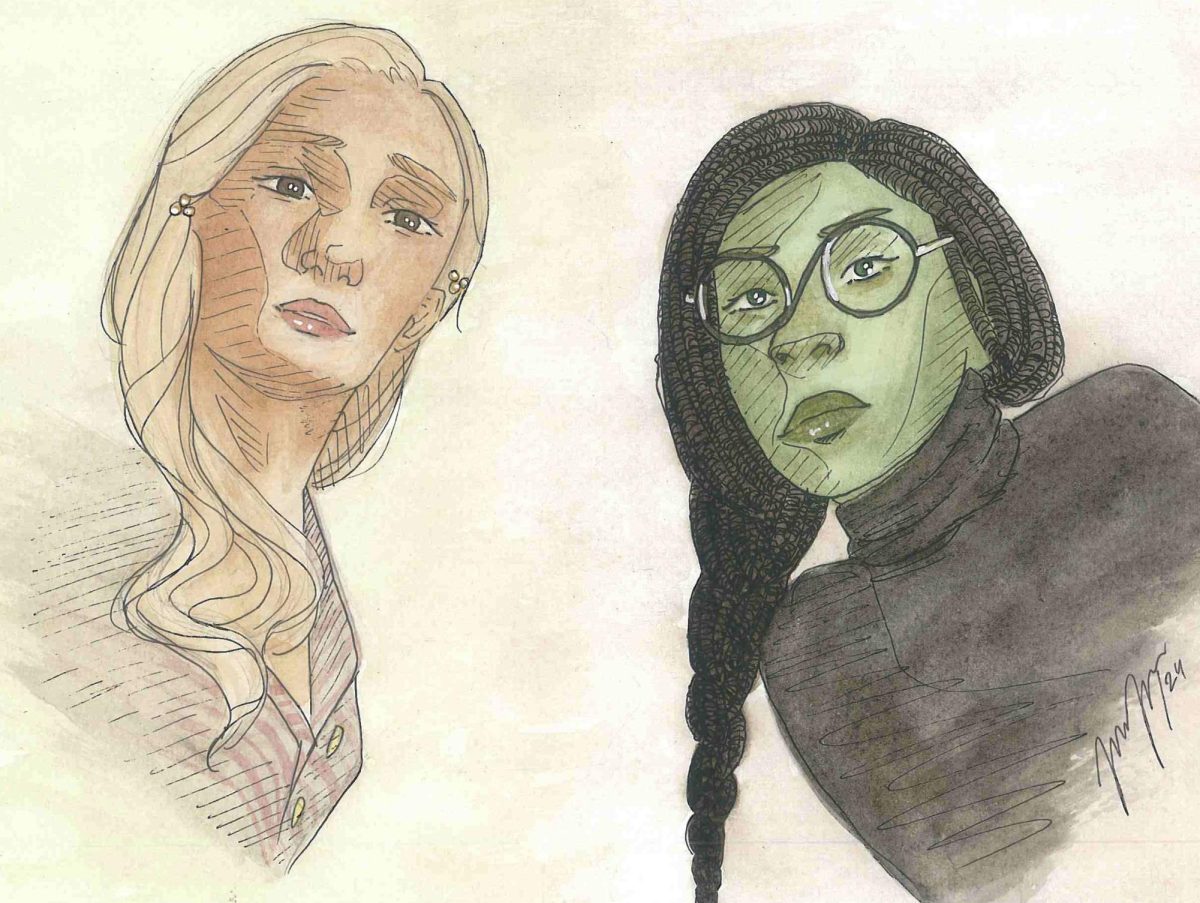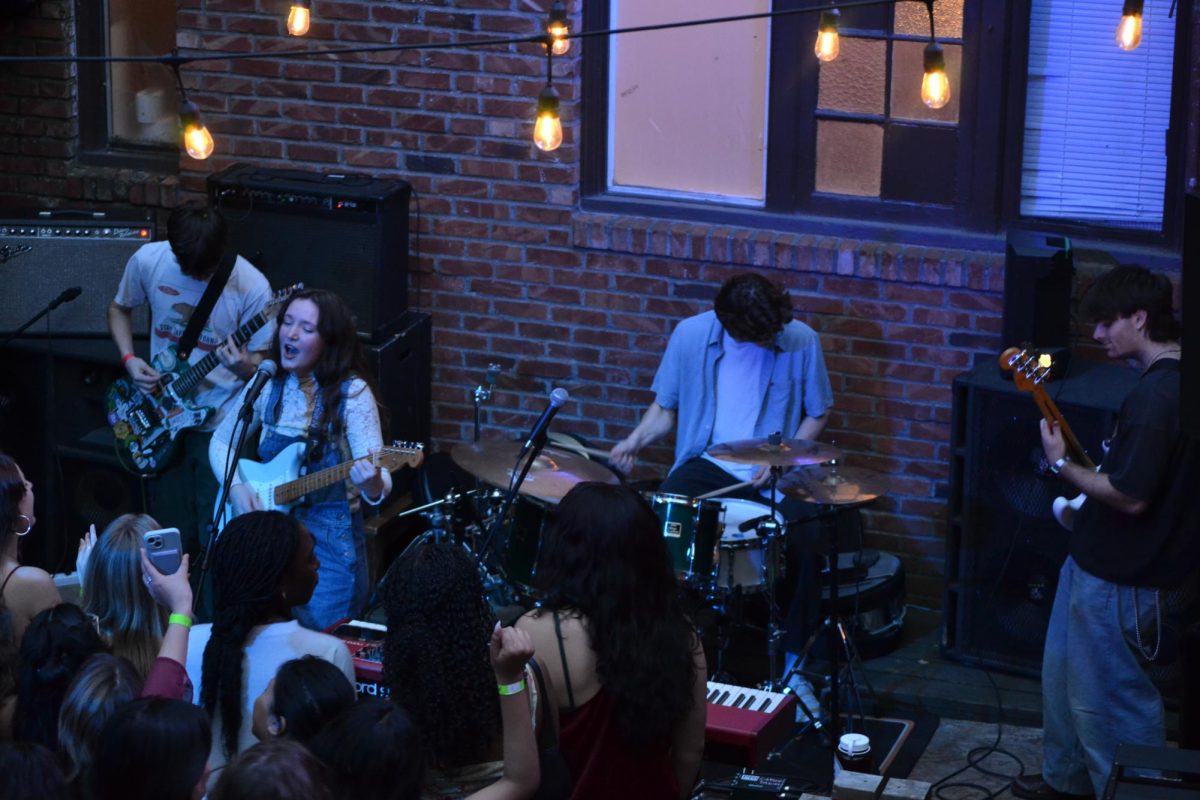I have seen the stage production of “Wicked” three times, and I must say, the movie was executed masterfully. Watching it brought back memories of the first time I saw the musical on stage at just eight years old, sparking a lifelong love for this story. The vibrant colors, captivating music and thoughtfully added scenes beautifully expanded the narrative, elevating what has captivated audiences on stage for the past 21 years.
In part one of “Wicked,” directed by Jon M. Chu and original story written by Gregory Maguire, Elphaba, born with green skin, is introduced as an outcast in the Land of Oz, marked by prejudice and her father’s shame. Her early years are shaped by her family’s dysfunction and the mysterious arrival of her younger sister Nessarose, who is born without arms. The narrative sets the stage for Elphaba’s eventual enrollment at Shiz University, where she meets Galinda (later Glinda), beginning their complex and evolving relationship.
“Wicked” is based on the story of the Wicked Witch of the West and Glinda the Good, and the relationship they once had before Dorothy ever landed in Oz. While the musical does not necessarily exist in the same canon of the original source material, it creates a wider view of the Land of Oz and the backstory of the characters.
Elphaba and Glinda initially clash due to their stark differences in personality and values — Elphaba is fiercely independent and unconventional, while Glinda is privileged and a bit vain. However, as they spend more time together, their animosity softens, leading to grudging mutual respect and eventually a deep, if not complicated, friendship that profoundly shapes both their lives.
I think that “Wicked” is a perfect example of how morals can be shaped and distorted in the pursuit of success. I cried before the movie even began. I have been watching all of the promotional interviews and felt antsy walking into the theatre. My excitement for the movie was well placed, in my opinion. I appreciated the choice to stretch certain parts to tell more of the story while honoring the original storyline.
Ariana Grande was pure perfection as Glinda, embodying the character’s quirky and bubbly nature with effortless charm. Her performance balanced lighthearted humor and depth, capturing Glinda’s expressive, effervescent personality while embracing her ditsy yet endearing qualities. Grande’s interpretation brought a fresh vibrancy to the role, making her portrayal both delightful and memorable.
On the other hand, Cynthia Erivo brought a powerful and nuanced perspective to Elphaba. She portrayed the character’s serious and determined nature with intensity and emotional resonance, offering a profound insight into Elphaba’s inner struggles and resilience. Erivo’s performance celebrated Elphaba’s authenticity, showcasing her courage and strength in staying true to herself despite the ridicule and prejudice she faced, making her journey deeply compelling.
Adding in the beginning sequence of Elphaba’s childhood and the addition of Nanny Bear or Dulcibear, voiced by Sharon D. Clarke, explains the connection that Elphaba will eventually have to her cause of giving voice back to the animals.
“Dancing Through Life” may have been my favorite part of the whole movie because of the use of the library and interaction between Fiyero, played wonderfully by Jonathan Bailey. Fiyero is such a complex character to me; he tries to present himself as not really caring about school, choosing to party and corrupt his fellow classmates. But, he is one of those characters that deep down cars a lot. He is the main love interest in the story battling between what he wants and how he is expected to act. I also never realized just how much foreshadowing there is about his fate in the story. Which we will see come to fruition in part two.
When it comes to the supporting cast, Ethan Slater’s performance as Boq, was not exactly memorable, nor was Marissa Bode as Nessarose. I do, however, appreciate how she showed jealousy for Glinda and longing for Boq.
Now to be a bit controversial, while I love Michelle Yeoh as an actress, I do not think she brought the right sense of motherly vibe to Madame Morrible, the character is the headmistress at Shiz, she takes a quick liking to Elphaba because of the power she possesses. Maybe because I know the story and how she ends up acting, but it was incredibly obvious that she had other plans for Elphaba the whole time. Instead, I think her choices for interacting with Glinda made sense, but something about the portrayal just didn’t resonate for me. Iit may be because it felt like her true intentions about only wanting power were clear from the beginning, instead of genuinely seeming like she wanted the best for Elphaba.
It took me the whole movie to realize it was Peter Dinklage playing Dr. Dillamond; his voice is memorable and familiar. He provided the warmth necessary for the goat professor. I also think Jeff Goldblum was the perfect choice for the wizard; I could not imagine anyone else playing the character. In the end, it was Bowen Yang who really made the movie. He plays Pfanne, one of Glinda’s friends. His little side quips were hilarious and made me giggle. I also loved that they brought in Idina Menzel and Kristen Chenoweth for “Wizomania;” it felt like there was a proud torch passing.
Trying to be concise in my thinking is hard when I hold so much love for something like I do with “Wicked.” For fans old and new, the film is a triumphant celebration of this beloved tale, and I, for one, am counting the days until Part two so I can relive the wonder all over again.



















































































